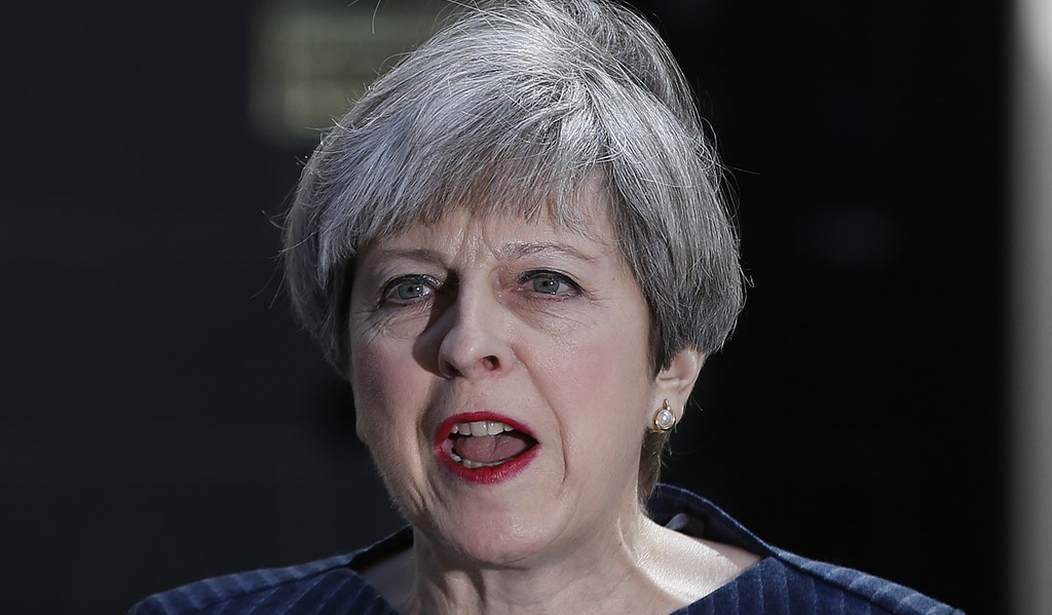Did Theresa May roll the dice — or play for safety? The British prime minister announced a general election for June 8th, three years ahead of schedule, a surprise move after beginning the early negotiations for Brexit and trying to stave off an independence push from Scotland. A win means May can claim a mandate for her own approach to Brexit. A loss could make Brexit impossible:
British Prime Minister Theresa May called Tuesday for an early election on June 8, seeking to cement her political backing as Britain moves ahead with the difficult negotiations on its break from the European Union.
The surprise announcement — made outside her office at 10 Downing Street — also comes amid internal political strains over Brexit and moves by Scotland to possible carve its own independent path to remain in the European Union.
The Washington Post’s Karla Adam notes that this is a major reversal from May, but it’s coming at an opportune time:
Her Conservative Party has a wide lead over its main rival, the center-left Labour Party, which has been at war with itself since the election of the far-left Jeremy Corbyn as leader in September 2015.
A recent poll showed that, in a head-to-head matchup between May and Corbyn, not even a majority of Labour votes would want Corbyn as their prime minister.
Oddly enough, Corbyn has already endorsed the snap election, even though he has the power to block it. The UK adopted new laws in 2011 that greatly reduced the authority of the prime minister to call new elections outside of the regularly scheduled five-year cycle; it now takes two-thirds of Parliament to approve such a call. If the Tory and Labour members vote to back May’s call, then she’ll have more than enough to meet the threshold.
What’s not terribly clear is why Labour wants an election. Corbyn told the press that it would “give the British people the chance to vote for a government that will put the interests of the majority first,” but for right now, the majority appears to be Tory and pro-Brexit. A major loss would likely end Corbyn’s career at the head of the party, too. Corbyn says Labour will contest the election on an economic agenda, as well as on other social issues:
Mr Corbyn said the Tories had “failed to rebuild the economy” and that he would be campaigning on housing, education and the NHS. …
Asked whether he was the next prime minister, Mr Corbyn added: “If we win the election, yes – and I want to lead a government that will transform this country, give real hope to everybody, and above all bring about a principle of justice for everybody and economic opportunities for everybody.”
The problem with this approach is that (a) Labour has a declining minority of voters who care about these as top priorities, and (b) Brexit is the primary economic issue — an issue of which Labour and Corbyn were on the wrong side. It might make better sense to block the election and force May to operate without any clarity on Brexit as it stands with the electorate now, and keep the next election scheduled in its immediate aftermath.
The timing of this election and the next has caught the attention of Deutsche Bank, which had been very pessimistic about Brexit and the pound sterling since the referendum. They see this play from May as a way to recalculate the election cycle to give her more breathing room in Brexit negotiations, and to give more room to a “soft Brexit” that will be better long term for the UK. They have ended their bearish buys on British currency as a result:
Previously uber-bearish Deutsche Bank upgrades sterling forecasts on grounds that snap election increases chances of a negotiated Brexit. pic.twitter.com/Flel2IeI9a
— Dan Roberts (@RobertsDan) April 18, 2017
If that’s the case, then it might help hold Scotland in the UK too. They are worried about a “hard Brexit” that cuts them off from the European market — as is Northern Ireland, about that and the border with the Republic of Ireland, too. Having more room and time to negotiate a softer landing might appease those who sympathize with calls for independence but do not feel passionately about it, undermining Nicola Sturgeon and her #IndyRef2 efforts.
Of course, to pull all this off, May has to actually win the snap election. If public sentiment has moved away from Brexit, we’ll know it on June 9th, assuming Corbyn and Labour don’t come to their senses first.









Join the conversation as a VIP Member